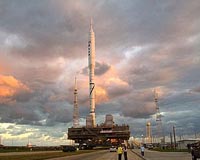 |
Washington DC (SPX) Oct 30, 2009 The National Space Society (NSS) welcomes the release of the Final Report of the Review of U.S. Space Flight Plans Committee, better known as the Augustine Commission. NSS thanks the Committee for its hard work and due diligence, and for the message that its Final Report seeks to convey: The United States can, and must, continue to be the world's leader in space, but to do so, our space program must be appropriately funded. NSS joins with the Committee in its call for an additional $3 billion in annual funding for NASA. "NASA has been chronically underfunded in recent years," says Greg Allison, Executive Vice President of the National Space Society. "Our nation's space program has simply not received the level of funding which has been needed, with the result that NASA has fallen further and further behind each year, being asked to do more and more with less and less. Although the common perception is that NASA receives a large percentage of our nation's budget, NASA's budget in recent years has actually been less than 6/10s of one percent of the national budget." Indeed, the Augustine Commission reported (on Page 22 of its Final Report) that at the present time the human spaceflight program costs each citizen only about seven cents a day. NSS asserts that NASA should receive this additional funding, as NASA has stimulated the economy like no other agency, inspired American youth to seek higher education, shored up America's edge in technology, enhanced our defense, and enhanced American prestige around the world. "One of the most important reasons for space exploration and development, which is frequently overlooked, is that we face a world with dwindling energy supplies," says Rick Zucker, Vice President of Public Affairs for the National Space Society. "However, there are untapped, and potentially unlimited, sources of energy in space, some of which lie just beyond the atmosphere that surrounds our fragile planet. Investment in our nation's space program would enable NASA to take the lead in research and development toward potential energy independence." Space could ultimately provide access to energy and resources such as space based solar power beamed to Earth, helium-3 for fusion power, platinum group metals for fuel cells that could enable a hydrogen economy, and strategic metals important to our economy and national defense. These programs offer capabilities that also could lead to developing resources from asteroids (and other "near Earth objects") and the means to protect our planet from their potential impact. Ultimately this could allow humanity to live in and "green" the cosmos. Gary Barnhard, Chairman of the Executive Committee of the National Space Society, added, "The National Space Society implores President Obama, and Congress, to take decisive action to restore the balance of funding necessary to implement and sustain a human spaceflight program that is worthy of a great nation, as advocated by the Human Spaceflight Plans Committee's Final Report. What is at stake is not just the orchestration of specific, attainable goals for space exploration and development in this generation, but whether or not we as a nation will be part of an international community that together reaches out to the stars." NSS calls on our nation's leaders for an additional $3 billion per year to be applied to NASA so that NASA can accomplish the missions that our government has tasked it with performing. Our economic prosperity and our nation's future depend on it. Share This Article With Planet Earth
Related Links National Space Society (NSS) Space Tourism, Space Transport and Space Exploration News
 Launch of new NASA rocket delayed by 24 hours
Launch of new NASA rocket delayed by 24 hoursCape Canaveral, Florida (AFP) Oct 27, 2009 Weather delays Tuesday forced NASA to postpone by 24 hours the launch of a prototype rocket designed to return astronauts to the Moon, and perhaps one day to Mars. Standing 327 feet (100-meters) tall, the Ares I-X is the longest rocket ever built and when lift-off goes ahead it will be the first spacecraft the Kennedy Space Center has launched other than a shuttle in 30 years. Tuesday ... read more |
|
| The content herein, unless otherwise known to be public domain, are Copyright 1995-2009 - SpaceDaily. AFP and UPI Wire Stories are copyright Agence France-Presse and United Press International. ESA Portal Reports are copyright European Space Agency. All NASA sourced material is public domain. Additional copyrights may apply in whole or part to other bona fide parties. Advertising does not imply endorsement,agreement or approval of any opinions, statements or information provided by SpaceDaily on any Web page published or hosted by SpaceDaily. Privacy Statement |